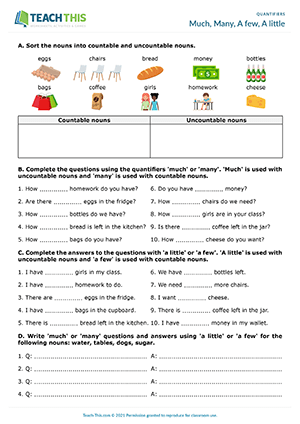

If I say that Tashonda has a little experience in management that means that although Tashonda is no great expert she does have some experience and that experience might well be enough for our purposes. There is an important difference between "a little" and "little" used with non-count words and between "a few" and "few" used with count words. In formal academic writing, it is usually better to use many and much rather than phrases such as a lot of, lots of and plenty of. Selecting the correct quantifier depends on your understanding the distinction between Count and Non-Count Nouns.įor our purposes, we will choose the count noun trees and the non-count noun dancing. Like articles, quantifiers are words that precede and modify nouns. Notice that the possessive nouns differ from the other determiners in that they, themselves, are often accompanied by other determiners: " my mother's rug," " the priests's collar," " a dog's life. The demonstratives this, that, these, those, such are discussed in the section on Demonstrative Pronouns. We can imagine that the language will never tire of inventing new adjectives the determiners except for those possessive nounson the other hand, are well established, and this class of words is not going to grow in number.

This limited nature of most determiner categories, however, explains why determiners are grouped apart from adjectives even though both serve a modifying function. Some categories of determiners are limited there are only three articles, a handful of possessive pronouns, etc. That is to say, you know a determiner will be followed by a noun. For other writers, though, this can be a considerable obstacle on the way to their mastery of English.ĭeterminers are said to "mark" nouns.
Quantifiers quiz how to#
Find out more about cookies and how to change your cookie settings I agree.Sometimes these words will tell the reader or listener whether we're referring to a specific or general thing the garage out back A horse!Ī horse! My kingdom for a horse! The choice of the proper article or determiner to precede a noun or noun phrase is usually not a problem for writers who have grown up speaking English, nor is it a serious problem for non-native writers whose first language is a romance language such as Spanish. By continuing you agree to our use of cookies. We use cookies to personalise content and ads, to provide social media features and to analyse our traffic. Related tests: much, many, a lot of, a little, a few. Would you like some help? Can I have some tea, please? Exercises: 1 2 3 4 5. Are there any students in the classroom? NOT Is there any student in the classroom? Mintakan card Have you got any new friends? I have some questions to ask you. Can you put a bit of sugar in the tea? Is there any sugar in the cupboard? Om 926 la torque specs He always gets good results with very little effort. I have to do a few things this afternoon. How many concerts have you ever been to? How much coffee have you had today? She spends a lot of time watching TV. Were there many people in the party? You eat too many biscuits. Exercise 1 Choose much, many, little, few, some, any to complete each sentence. Exercises Explanation Exercises: 1 2 3 4 5. But if we use them before a countable noun, the noun must be in plural form.ĭo the exercises. Both some and any can be used before countable and uncountable nouns.

We use some in affirmative sentences and any in negative sentences and questions. We normally use them in positive sentences. We use a lot of or lots of more informal before both plural countable and uncountable nouns. We use how many and how much to ask about quantity. We use them in negative sentences and questions.


 0 kommentar(er)
0 kommentar(er)
